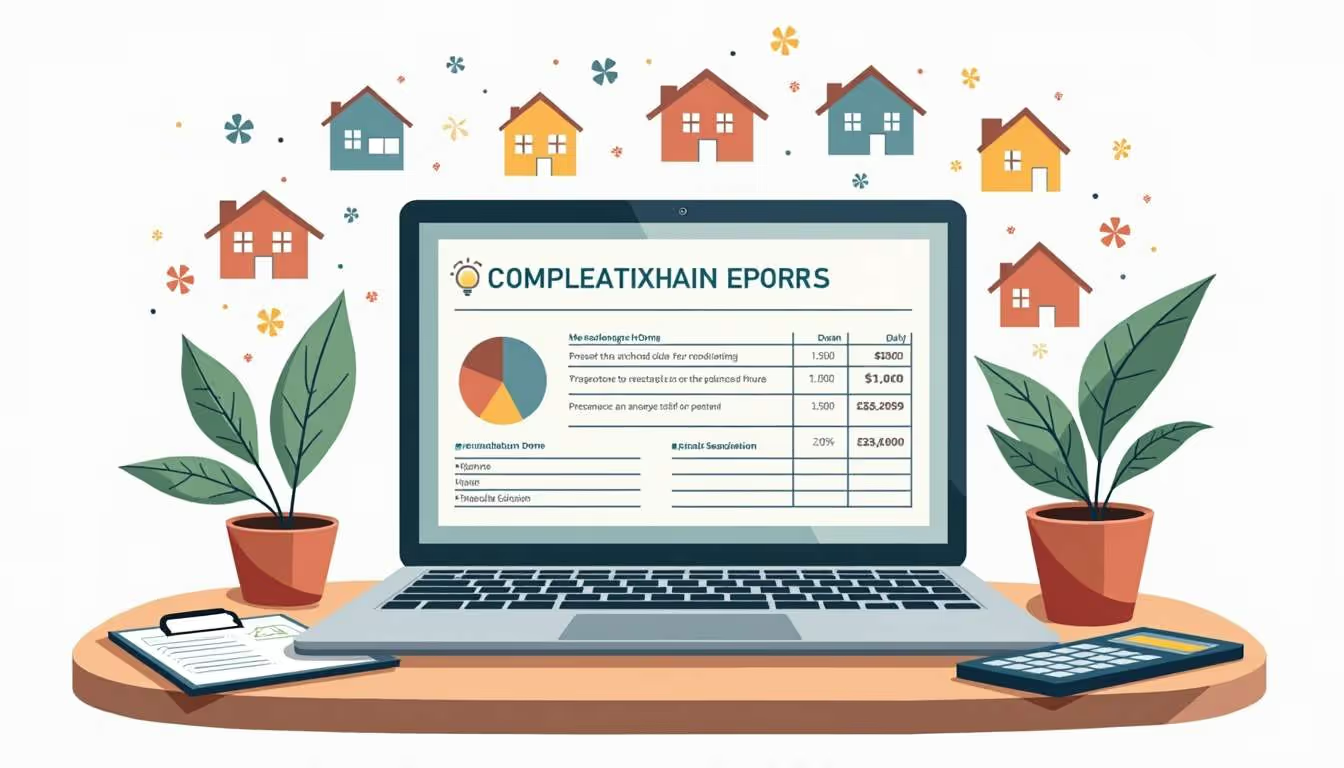How to Generate Reconciliation Reports for Vacation Rental Homes
In the bustling arena of vacation rentals, maintaining precise financial records is pivotal for thriving. A critical asset for property managers and owners is the reconciliation report. This report ensures that all financial transactions are in harmony with the records, offering transparency and averting discrepancies. This article will walk you through the steps to create reconciliation reports specifically designed for vacation rental homes.
Understanding Reconciliation Reports
Reconciliation reports act as a financial health check for vacation rental properties. They juxtapose the income and expenses logged in your accounting system against bank statements and other financial documents. This process helps pinpoint any inconsistencies, ensuring that all transactions are accounted for. By keeping accurate records through reconciliation, property owners can not only protect their investments but also boost their overall operational efficiency.
What is Included in a Reconciliation Report?
An exhaustive reconciliation report generally includes several vital components:
By scrutinizing these components, property owners can gain insights into their financial health and make informed decisions moving forward. Moreover, a detailed breakdown of income sources can reveal trends in guest preferences, such as which amenities are most popular or which seasons yield the highest occupancy rates. This information can be invaluable for customizing marketing strategies and optimizing pricing models.
Why Are Reconciliation Reports Important?
Generating reconciliation reports is not merely a matter of good practice; it is essential for several reasons:
Furthermore, reconciliation reports can serve as a crucial tool during audits or financial reviews. Having well-organized and accurate records can streamline the auditing process, making it easier to provide necessary documentation and explanations. This not only saves time but also builds credibility with stakeholders, including investors and financial institutions, who may require transparency regarding the property’s financial performance.
Steps to Generate Reconciliation Reports
Creating a reconciliation report may seem daunting, but by following a structured approach, the process can be streamlined. Here are the steps to consider:
1. Gather Financial Documents
The first step in generating a reconciliation report is to collect all relevant financial documents. This includes:
Having all this information at hand will facilitate a more accurate reconciliation process. It's also beneficial to include any additional documentation that may support your financial entries, such as contracts or agreements related to bookings. This comprehensive approach not only enhances accuracy but also provides a clearer picture of your financial landscape.
2. Organize Your Data
Once all documents are gathered, organize the data into a manageable format. This could be a spreadsheet or accounting software that allows for easy comparison. Ensure that all transactions are categorized correctly, making it easier to identify discrepancies later on. Additionally, consider implementing a color-coding system or using filters to highlight different types of transactions, such as income versus expenses. This visual aid can significantly speed up the review process and help you quickly pinpoint areas that require further investigation.
3. Compare Income and Expenses
With organized data, the next step is to compare the income and expenses recorded in your system against those on the bank statement. Look for any missing transactions or amounts that do not match. This step is crucial for identifying errors or potential fraud.
For example, if a booking payment is recorded in your system but not reflected in the bank statement, it could indicate a processing error or a missed payment. Conversely, if there are transactions on the bank statement that do not appear in your records, it may suggest unauthorized withdrawals or accounting oversights. To mitigate these risks, consider implementing regular audits and reconciliations, which can help catch discrepancies early and maintain the integrity of your financial reporting.
Using Technology for Reconciliation
In today’s digital age, leveraging technology can significantly simplify the reconciliation process. Numerous software solutions are available that can automate much of the work involved in generating reconciliation reports. By utilizing these tools, businesses can not only enhance their efficiency but also gain deeper insights into their financial health, allowing for more informed decision-making.
Choosing the Right Software
When selecting software for reconciliation, consider the following features:
Additionally, consider the scalability of the software. As your business grows, your reconciliation needs may evolve, and having a solution that can adapt to increasing transaction volumes and additional features will save you from the hassle of switching systems later on. Furthermore, customer support is crucial; ensure that the software provider offers robust support options to assist you during implementation and beyond.
Automating the Process
Automation can save time and reduce errors in the reconciliation process. Many software solutions allow for automatic imports of bank transactions, which can then be matched against your recorded income and expenses. This feature not only speeds up the process but also minimizes the risk of human error. Furthermore, some advanced systems utilize machine learning algorithms to improve the accuracy of transaction matching over time, learning from past reconciliations to enhance future performance.
Regular Updates and Maintenance
To maintain accurate financial records, it’s essential to regularly update your software and ensure that all transactions are entered promptly. Schedule regular intervals for reconciliation, whether monthly or quarterly, to keep your financial records in check. Additionally, consider implementing a routine training program for your team to ensure they are fully equipped to utilize the software’s features effectively. This can lead to greater efficiency and a more cohesive understanding of the reconciliation process across your organization.
Moreover, staying informed about updates and new features released by your software provider can provide you with tools that enhance your reconciliation process even further. Many providers offer webinars and tutorials that can help users maximize the software's potential, ensuring that you are always utilizing the best practices in financial management.
Best Practices for Effective Reconciliation
To ensure that your reconciliation reports are accurate and useful, consider implementing the following best practices:

Maintain Consistent Records
Consistency is key in financial record-keeping. Ensure that all income and expenses are recorded in a timely manner. This practice not only simplifies the reconciliation process but also provides a clearer picture of your property’s financial health.
Document Everything
Keep detailed records of all transactions, including receipts, invoices, and bank statements. This documentation will serve as a valuable reference during the reconciliation process and can help resolve any disputes that may arise.
Engage a Professional Accountant
If managing finances becomes overwhelming, consider hiring a professional accountant. An experienced accountant can provide valuable insights, assist with complex reconciliations, and ensure compliance with tax regulations.
Common Challenges in Generating Reconciliation Reports
While generating reconciliation reports is essential, several challenges can arise during the process. Being aware of these challenges can help property owners and managers navigate them more effectively.

Discrepancies in Transactions
One of the most common challenges is discrepancies between recorded transactions and bank statements. These discrepancies can arise from various factors, including timing differences, errors in data entry, or unrecorded transactions. Identifying the source of these discrepancies is crucial for accurate reconciliation.
Time Constraints
For many property managers, time is a precious commodity. Balancing the demands of managing a vacation rental with the need to maintain accurate financial records can be challenging. Implementing automated solutions can help alleviate some of this pressure, allowing for more efficient reconciliation.
Lack of Financial Knowledge
Not everyone has a background in finance, which can make the reconciliation process daunting. Providing training for staff or utilizing user-friendly software can help bridge this gap, ensuring that everyone involved understands the importance of accurate financial reporting.
Conclusion
Generating reconciliation reports for vacation rental homes is a vital practice that ensures financial accuracy and transparency. By understanding the components of reconciliation reports, utilizing technology, and adhering to best practices, property managers and owners can streamline the process and enhance their financial management.

Regular reconciliation not only helps in maintaining accurate records but also provides insights into the financial performance of the property, enabling informed decision-making. As the vacation rental market continues to grow, effective financial management will be a key differentiator for success.
Incorporating these strategies will not only simplify the reconciliation process but also contribute to the overall health of your vacation rental business. Embrace the tools and practices available, and ensure that your financial records reflect the true performance of your property.
Ready to take the next step in streamlining your vacation rental business's financial management? Discover how VRPlatform can transform your reconciliation process with our comprehensive suite of features designed to automate accounting, ensure trust accounting compliance, and provide unparalleled transparency. From seamless PMS and payment gateway integrations to detailed owner and manager statements, VRPlatform is the solution property managers, accounting partners, and property owners trust for growth and efficiency. Sign up for a free trial today and experience the difference VRPlatform can make in your vacation rental operations.



